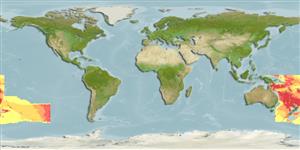Klassifizierung / Names
Namen | Synonyme | Catalog of Fishes(Gattung, Arten) | ITIS | CoL | WoRMS | Cloffa
>
Perciformes/Scorpaenoidei (Scorpionfishes) >
Scorpaenidae (Scorpionfishes or rockfishes) > Scorpaeninae
Etymology: Phenacoscorpius: Greek, phenax, -akos = deceptive + Greek, skorpion = scorpion (Ref. 45335); longilineatus: Name from Latin word meaning long line, referring to the long lateral line, associated with the greatest
number of pored lateral-line scales in the genus..
Environment: milieu / climate zone / depth range / distribution range
Ökologie
seewasser bathypelagisch; tiefenbereich 345 - 1089 m (Ref. 92845). Deep-water
Southwestern Pacific: New Caledonia and New Zealand.
Size / Gewicht / Alter
Maturity: Lm ? range ? - ? cm
Max length : 10.5 cm SL Männchen/unbestimmt; (Ref. 92845)
Kurzbeschreibung
Morphologie | Morphometrie
This species is distinguished by the following set of characters: pectoral-fin rays 16-18 (mode 17), middle rays branched in young and adults; pored lateral-line scales 8-18 (mode 12), with last pored scale situated from below base of seventh spine to below base of fourth dorsal-fin soft� rays; scale rows in longitudinal series 50-52; gill rakers 18-21 (mode 20); no slit behind fourth gill arch; palatine teeth present; second preopercular spine always absent; nuchal and parietal spines distinct; suborbital spines in young and adults 4-6 (mode 5) and in larger adults 6-7; nape and anterior part of body strongly arched in adults of over ca. 80 mm SL; relatively long postnuchal-spine length, 5.0-9.7% (mean 7.2%) of SL; relatively short caudal fin length, 2.4-26.7% (mean 23.4%) of SL; black spots on posterior half of caudal peduncle 1-5 (mode 2); body usually uniformly whitish without distinct dark saddles in preserved specimens (Ref. 92845).
Life cycle and mating behavior
Geschlechtsreife | Fortpflanzung | Ablaichen | Eier | Fecundity | Larven
Motomura, H., R. Causse and C.D. Struthers, 2012. Phenacoscorpius longilineatus, a new species of deepwater scorpionfish from the Southwestern Pacific Ocean and the first records of Phenacoscorpius adenensis from the Pacific Ocean (Teleostei: Scorpaenidae). Species Diversity 17:151-160. (Ref. 92845)
IUCN Rote Liste Status (Ref. 130435)
Bedrohung für Menschen
Harmless
Nutzung durch Menschen
Fischereien:
Mehr Information
NamenSynonymeMetabolismusRäuberÖkotoxikologieFortpflanzungGeschlechtsreifeAblaichenSpawning aggregationFecundityEierEientwicklung
Alter/GrößeWachstumLänge-GewichtLänge-LängeLängenhäufigkeitenMorphometrieMorphologieLarvenLarven Pop.Dyn.RekrutierungDichteBRUVS
ReferenzenAquakulturAquakultur ProfilZuchtlinienGenetikElectrophoresesVererbbarkeitKrankheitenVerarbeitungNutrientsMass conversion
PartnerBilderStamps, Coins Misc.LauteCiguateraGeschwindigkeitSchwimmstilKiemenoberflächeOtolithsGehirngrößeSehfähigkeit
Tools
Zusatzinformationen
Download XML
Internet Quellen
Estimates based on models
Preferred temperature (Ref.
123201): 3.2 - 4.8, mean 4.3 °C (based on 138 cells).
Phylogenetic diversity index (Ref.
82804): PD
50 = 0.5156 [Uniqueness, from 0.5 = low to 2.0 = high].
Bayesian length-weight: a=0.01778 (0.00696 - 0.04547), b=3.03 (2.81 - 3.25), in cm total length, based on LWR estimates for this (Sub)family-body shape (Ref.
93245).
Trophic level (Ref.
69278): 3.6 ±0.6 se; based on size and trophs of closest relatives
Widerstandsfähigkeit (Ref.
120179): hoch, Verdopplung der Population dauert weniger als 15 Monate. (Preliminary K or Fecundity.).
Fishing Vulnerability (Ref.
59153): Low vulnerability (10 of 100).
